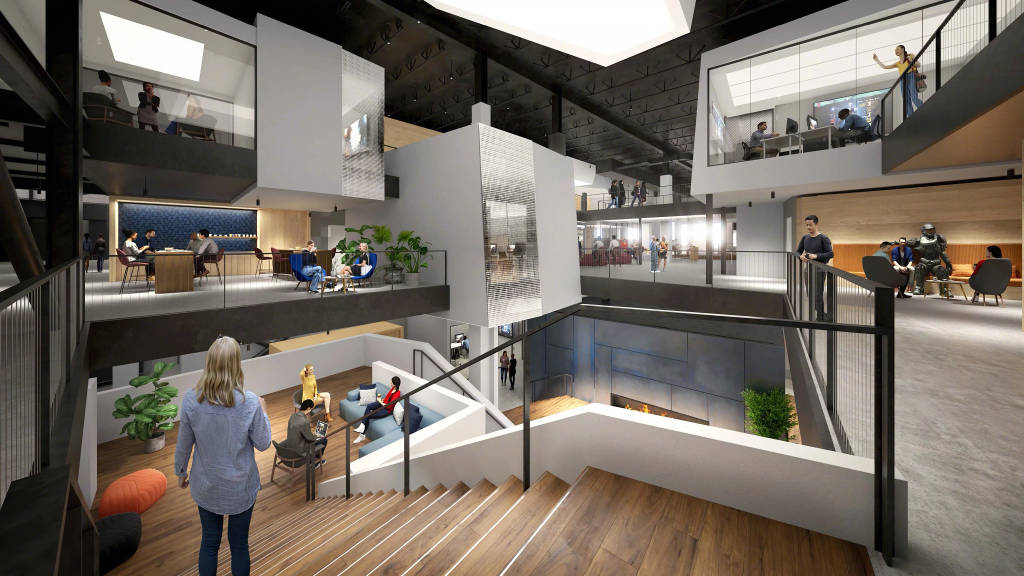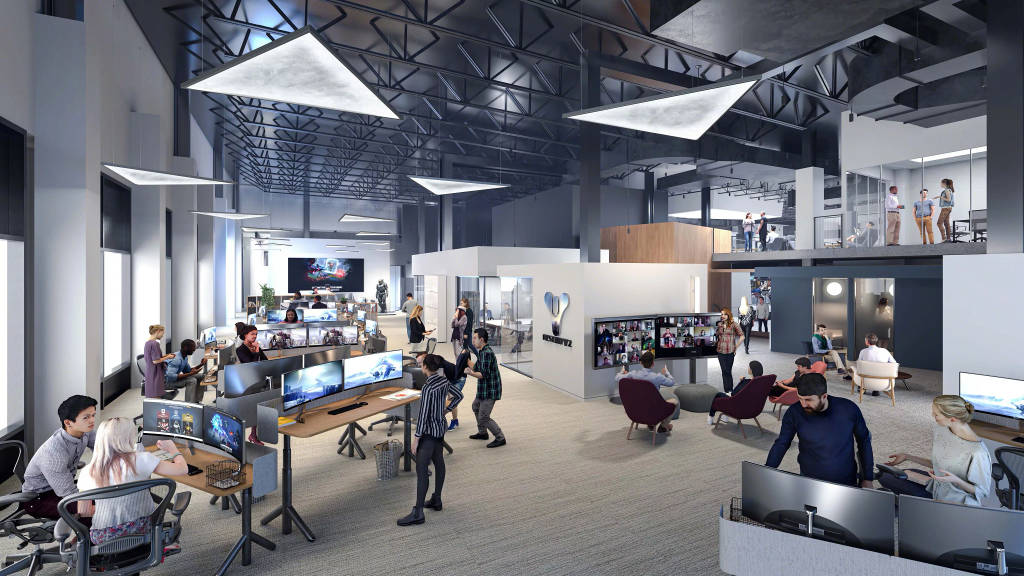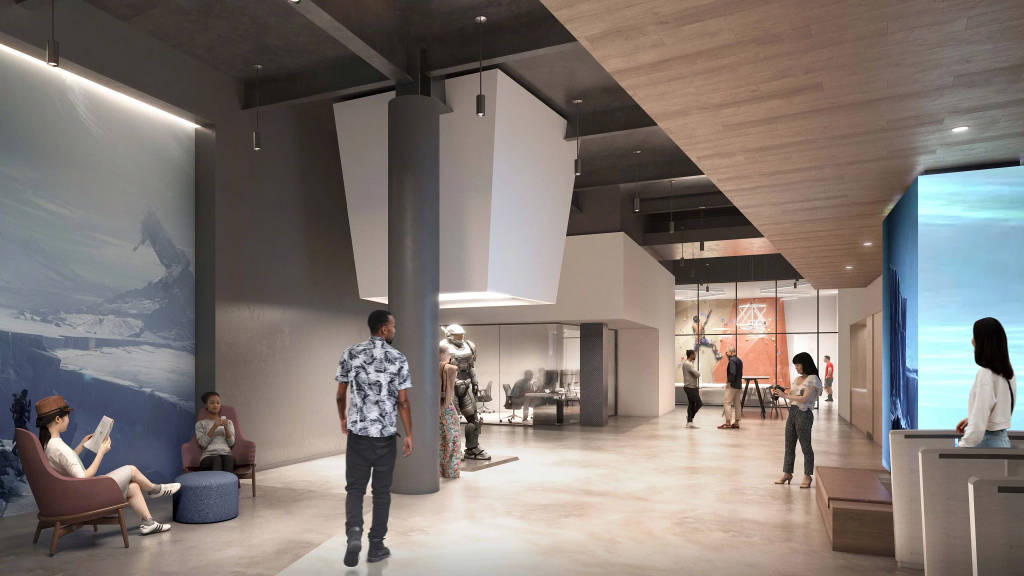How Bungie embraces a digital first experience and a new headquarters to create community
Bellevue, Washington-based Bungie Games, best known for spawning the epic Halo gaming franchise, is unveiling a new headquarters with spaces designed to provide a center of focus and collaboration while adopting a “digital-first” work model. Dr. Tracy Brower, VP of Workplace Insights at Steelcase, talks with Bungie HR leader Holly Barbacovi about how the entertainment leader creates community in the office while allowing flexibility for remote work.

Tracy Brower: In what ways have your perspectives on work experience changed or adapted over the last couple of years?
Holly Barbacovi: I think it’s changed tremendously with COVID. There are a lot of workplace norms we thought were important and necessary, but as we all worked from home for a couple of years, those norms were really debunked – and that’s particularly true in the games industry.
I think in the creative industries in general we have this sense that people being able to creatively collaborate in a common workspace is critical for being able to make brilliant entertainment. However, the expansion to our game that we shipped in early 2022 was our highest revenue yielding and our highest-rated expansion. And that was done entirely from home. So, we’ve debunked some of these ideas that held us in an unnecessary structure and we’re rethinking why people come into the workplace.

TB: How are employee expectations changing among your employees?
HB: Employees expectations certainly have changed with regards to the flexibility they have in their day. When we all went home, we were juggling a lot of things that we hadn’t previously. For example, my husband would stop by my desk and want to talk to me about something that was happening with the children. We context switch so much more when working from home. Or I think about when you’re at home – you can quickly go out and run an errand or deal with a childcare issue – that flexibility was just sort of inherently built in. As people are coming back to the office, they’re looking to keep that flexibility.
Separately, I think a lot has happened from a social perspective in the world during that same time period. We’re seeing this show up in legislation with regards to transparency. There is now an employee expectation that they should have a better understanding of what’s behind the curtain when it comes to compensation and decisions leaders are making. Are those decisions equitable and fair? For example where we’re located in Washington state, pay targets will be legally required in publicly posted job descriptions. It just really changes the conversation with employees about pay. When you mix not having to commute and having to pay for lunch out with a need for more wage transparency – pay is really in the spotlight now.
TB: As you consider your employee value proposition, how does the work experience figure into it? How is place part of it?
HB: For us, place is really about community. I think, overall, that could really be the biggest change in the office. Now we want to come to the office because we want to see the people we’re working with, and we use that as a way to build trust. I always say, with every employee interaction you are either building or eroding trust. So, if you can be thoughtful about that, you can always be on the side of building trust through those in-person interactions. Those unexpected collaborations are the moments that build community and build trust.
When we think about creating our workspace, it is a lot less about maximizing productivity and far more about how we are creating community.
TB: What are your guidelines about choice and about people coming into the office?
HB: We have been in a massive renovation of our headquarters, and so through the course of that and being remote for the pandemic, we had more and more demand for out-of-state employees. In light of that, we just decided to unleash the floodgates and declare ourselves as a digital first company. That means we are never going to force employees to come back into the office for any specific days or times. However, we are going to encourage our leadership to come in and be accessible to employees. As we open our renovated headquarters, I’m really encouraging leaders to commit to eating lunch in the common space on certain days so we can find each other and have the unstructured conversations that don’t happen as organically in the 2D environment.
TB: Thinking about space as part of the employee value proposition, what are the elements of place that you’re designing so they’re part of a meaningful employee experience?
HB: A large common dining space is a really important aspect of having a space for organic collisions. Then, creating other reasons for people to come – snacks and drinks have always been a part of Bungie’s history. We also have a workout space and a climbing wall to help people socialize. It’s really going to be a spectacular office.
Because we make games, we have play-test spaces where teams will be able to come in and play the games at the same time in the same space, which can be a really fun experience. So, it’s work, but it is very communal. That’s what it’s all about – making it a more communal experience where you come by choice because it’s a great place to be. Another thing our new renovated headquarters will have is each employee resource group will have a table. That’s so people can re-engage employees who haven’t been together to share their common interests. Everyone has been on digital meetings, so it’s important that we give our gardening club and mountain-climbing club and photography club places where they can get together and give them a reason to come in because we still believe there’s a strong place for in-person work. We want people to want to be here, as opposed to requiring them.

TB: You’ve declared yourself digital first, and you’re planning to hire more people in more places. How do you think about culture, given that people will be distant and remote?
HB: Culture is reinforced by every interaction and every communication you have, so I feel like we have retained a lot of the vehicles for being able to perpetuate culture. We have regular interactions with our employees and in each one of those, we’re very deliberate about the language we use and every decision we make. And special events matter a lot to Bungie employees. For instance, we’ve decided to make our annual Bungie Day in July our anchor event that we fly all our employees in for. Bungie Day is a day of reflection of what we’ve done over the past year and recognition for service, but also a look forward to what is ahead of us in the next year. During this time, we only structure two days of that week because we want enough unstructured time for smaller teams to get together and do sprint planning or go take part in morale events.
TB: What are the key business issues you’re focusing on as an organization and as an HR team?
HB: We are really moving towards having more products in the market and so our big challenge right now is scaling responsively, especially in the economic climate where we’re seeing recession and a lot of layoffs. The emphasis becomes about being mindful about scaling the organization to be able to support these multiple products and markets, but not so overextending ourselves that we find ourselves in trouble like some of the other companies we’re seeing right now. My number one challenge is making smart decisions about all of our people and our friends.
TB: What’s your perspective on the role of HR in the future?
HB: I think we’ve gone pretty far down the pathway of being more strategic and less transactional. There is a social element and an engagement element this next generation really requires of their workplaces. I believe HR plays a pretty big role in thinking through what are the employee perks around social impact that you want to program into your employee value proposition. We are just planning for Fiscal ‘23 and one of my line items is to create a volunteer hours benefit. So, we’re going to reassess all our time away policies and try to make space for volunteerism. We want to be clear about what Bungie stands for, so we’re putting a strike team together to be able to articulate clearly what our values are and what kind of global inclusion pillars we operate on.

As Chief People Officer for Bungie, Holly is responsible for creating an environment and employee experience where all game creators can do their best work. This covers a wide variety of disciplines, including Staffing, Learning & Development, Organization Development, Executive Coaching, Culture Transformation and Employee Relations for a globally distributed team. Holly is also the proud mother of 15-year-old twins who are already far better at video games than she could ever hope to be.
Originally published on Steelcase.com

